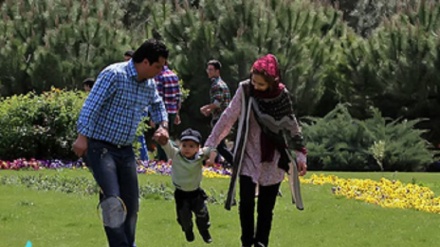Iranian Family (39)
Family has been introduced as a criterion for understanding accomplishments, and/or social vulnerabilities, such that in order to realize the root causes of derailment from the righteous path, one can refer to the related individual's family.
Family is of paramount importance, given that it plays a crucial role in conveyance of traditions, beliefs, and perceptions. Parents, via upbringing their children, present the cultural heritage of previous generations to their offspring. Generally speaking, children take their first steps for socialization within their families, ultimately turning into completely sociable individuals. Family shapes and forms the first and initial social identity of the individual.
Family members are in need of food, clothing and housing, in addition to establishment and maintenance of social bonds, amity, self-actualization, excitement, happiness, and unity. Hence, family members contribute to an emotional network, belong to a social group, and maintain a common history. The importance of a family is rooted in these accomplishments. Every given family's parents should be committed to formation of a healthy relationship. Previously, we spoke of the family's crucial and decisive role in children's upbringing. Within family, children learn how to live, from their parents. One learns many lessons at home. Naturally, the extent of any given individual's accomplishments within the community is tied to his upbringing.
Sociologists divide families into a number of categories which are namely; families who are hard on their children, families who are easy on their children, fractured families, and healthy and powerful families.
The families who are hard or easygoing on their children, in fact, go to extremes. Within families who are hard on their children, parents treat their children the same as how they were treated by their own parents. In this category of families, decision is usually made by one of the parents, mainly the children's father. usually, the paternal figure within these families controls the behavior and conduct of his children, while none of the other family members are permitted to express their views in this regard. In such families, excessive emphasis is placed on the related parents' power, and parents demand their children's complete obedience. In these families, children don't even dare to ask questions about doing or not doing different tasks. Thus, children are denied of their rights. Children of such families are rarely self-reliant, and usually lack creativity. These children aren't curious and believe that their parents are indifferent and inattentive toward them. Children who are brought up in such families are obedient, while concurrently displaying aggressive behavior. They are insecure and usually dependent, and are rarely popular among their peers.
The other family type, are the ones within which parents are easy on their children. One of the features of this family category is that parents do not teach social behaviors to their children. In such families, generally, there are highly limited rules and regulations, and the family members are not committed as such toward implementation of family rules and customs. Based on the outlook of members of such families, family members should not intervene in each other's deeds. In these families, parents do not pay attention to their children's upbringing, and their physical and psychological needs.
The goals and expectations of such families are not transparent, and therefore parents do not have a specific approach, philosophy, or outlook for their children's upbringing. Moreover, parents in such families are not disciplined toward their children's upbringing, and do not have any expectations of their children in this regard.
The children of such families turn into inexperienced, submissive, and fragile adults, and are usually shaken mentally. Furthermore, the related children usually lack a sense of responsibility. Such children are incapable of living within the community.
MR/EA


